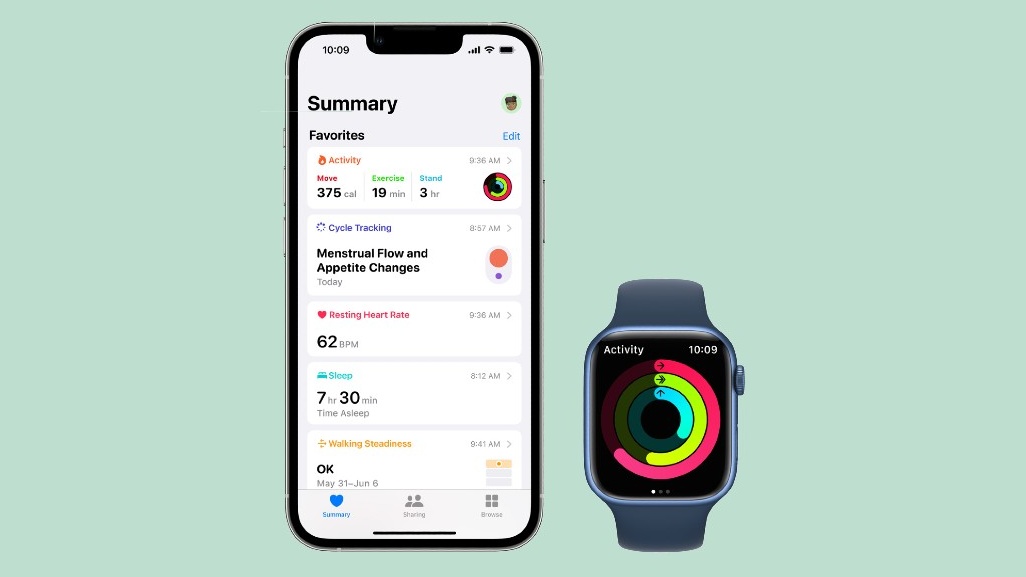Here's how the iPhone and Apple Watch are becoming vital health devices
Apple's new report casts the iPhone and Apple Watch as key devices for all kinds of health data transactions

Apple just reminded everyone it takes health seriously. The company has shared an extensive report detailing both the ways users are managing their health through Apple devices and how those in the medical community are using Apple devices to conduct research as well as connect with patients.
The Health app, a fixture on the iPhone since 2014 and a program with deep Apple Watch integrations, houses a surplus of user wellness information from sleep and exercise to hearing health and heart data. Last year, Apple launched a bridge for users to share their medical information easily with family or doctors — this year, in iOS 16, the Health app earned a new medication-tracking feature and an AFib history tool for Apple Watch users with atrial fibrillation.
In the report, Apple highlights the Health app’s hallmarks as well as the upgrades in iOS 16 and watchOS 9. In fact the report covers all 17 of the Health app’s existing “areas” in detail, including anecdotes about fall detection, insights on cardio fitness, the development of mobility metrics and why things like mindfulness, regular activity and sleep matter to holistic wellness.
If you’ve ever wondered everything your iPhone and Apple Watch could tell you about your health, I recommend checking out the report. It’s perhaps the most comprehensive and consolidated guide to the Health app to date.
Apple Health — The latest on health studies
Beyond showcasing the personal user experience with Health, the report covers the additional transactions between medical communities and Apple devices.
You may have heard of the Apple Health Studies before, the most recent of which included the Women’s Health Study on polycystic ovarian syndrome (PCOS.) The Apple Heart and Movements Study and the Apple Hearing Study are the other research initiatives Apple has led in-house. “Interim indications'' for some of the studies can be found in the report, though they are all ongoing and intended to produce more information over time.
These studies have been made possible by the research app and ResearchKit developer framework, which lets the data from users who opted in be collected and analyzed by researchers.
Sign up to get the BEST of Tom's Guide direct to your inbox.
Get instant access to breaking news, the hottest reviews, great deals and helpful tips.
Apple Health — Connecting doctors with patients
As I mentioned above, iOS 15 made it seamless to share health data with others, including your doctor (depending on your healthcare system and clinician, of course.) This enables consistent assessments, assembled health records and real-time care when needed.
In the report, multiple doctors celebrate the changes in technology that may facilitate faster and more effective treatment. Not only that, with the Health App’s support for third-party apps, doctor’s can gather more personalized information based on a given patient’s needs Some apps noted are Butterfly iQ+ for ultrasounds, Triton AI for monitoring postpartum transfusions and NightWare for reducing nightmares based on Apple Watch heart rhythm data.
And for in-person visits, the Apple devices are reportedly streamlining the hospital and clinic experiences. According to the report, nurses in over 90% of the top 20 hospitals in the U.S. use an iPhone for clinical communication. I even know my sister, a pre-med student, uses an iPhone daily in her dermatology fellowship.
Apple Health — is privacy a concern?
With all the talk of collecting and sharing health data, the report makes a point to reference privacy on multiple occasions. When it comes to sharing health information either with a Health Study or clinicians, users can always choose whether or not to enable permissions.
Having your entire health history in an app on your phone certainly sounds unnerving. Apple's end-to-end encryption, promising no one besides you and who you've assigned can see your data, may ease concerns; however, I think privacy worries will remain a barrier to the deeply connected health experience outlined in the study.
As someone with a generally positive outlook on digital transactions (I mean, I hardly have to bring a wallet out with me anymore, it's great) it sounds ideals for my doctor to have my entire medical history with a single press of a button. I switch clinicians or see different specialists pretty often, and I imagine it'd be convenient if all accepted my Health App data as my history record.
But again, I think we're a few years off from the health and medical ecosystem explored in Apple's new report being truly embraced. From what I see in the wearable market, people are still learning how to manage health data for their own interests or applications with the best smartwatches and best fitness trackers.
Though if our phones are already turning into keys to our door and our IDs, I imagine they could just as well become our health histories.
Next: How to get an Apple Watch for free through your health insurance
Kate Kozuch is the managing editor of social and video at Tom’s Guide. She writes about smartwatches, TVs, audio devices, and some cooking appliances, too. Kate appears on Fox News to talk tech trends and runs the Tom's Guide TikTok account, which you should be following if you don't already. When she’s not filming tech videos, you can find her taking up a new sport, mastering the NYT Crossword or channeling her inner celebrity chef.

